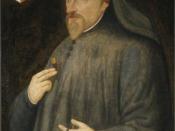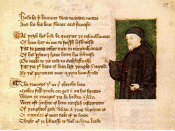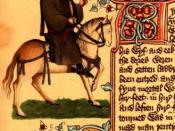The Ironic Pilgrims of The Canterbury Tales and their Moral Lessons
In the early centuries, religion ruled the land and people. People demanded more voice in the affairs of government, the church became corrupt this corruption also led to a more crooked society. Nevertheless there is no such thing as a just church in history; This is because the church can never be studied in isolation simply because it has always related to the social, economic, and political context of the day. In history, there is a two way process where the church has an influence on the rest of society and of course society influences the church The first rulers came about from the idea that God sent forth these people to rule over the land. Literature during these times was highly influenced by religion (Johnston 81). Evidence of the role and impact of religion in society is shown in Geoffrey Chaucer's Canterbury Tales of the fourteenth century.
Chaucer creates a near phenomenon for his time, that still exists today with the Canterbury Tales. The Tales weave lively characters varied in class and gender to create an end result that transcends the medieval setting to continuously intrigue modern critics. These characters he creates range anywhere from a rich lady from Bath to a drunken miller. Despite the fact that while reading Chaucer's work you will constantly need the help of a dictionary, his work truly marks the contemporary ethos, because of the irony, the pilgrims, and the moral lessons presented in his works. Yet critics argue that Chaucer's work should be approached as a collection of distinct pieces. Primarily because of the language he uses. Geoffrey Chaucer writes The Canterbury Tales in what's known as "Middle English" during the 14th century. Chaucer is credited by some scholars as the...


